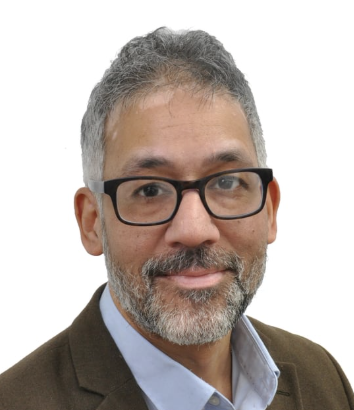In 2021 I found myself running at the front of the London Marathon. On each side of the road the crowd were whooping and cheering. The weather was cool and overcast. It was a perfect day to run a personal best. There was nobody ahead of me. I glued myself to the blue line. I knew this to be the fastest way to get through this 26.2 miles. I felt at one with the crowd. Participation mystique. Was I running or was the crowd running, I was no longer sure.
My running partner point kept looking over his shoulder. I told him don't look behind just look ahead. I saw him looking up above into the heavens. There were helicopters in the sky. I told him do not look above. Just look ahead. Just focus on the next step.
As some of you may have gathered I was not actually an official entrant into this year's London Marathon. I was simply out running with my running partner, and we had got a bit over enthusiastic. Soon enough the elite men swept past us dancing to a totally different rhythm. However soon enough I saw a running club friend amongst the first 100 runners and I sprinted along with him for 200 yards sharing the moment.
I said to him, dream the dream.
I have actually run seven official marathons. A running friend called me on the night of my first ever marathon. He gave me advice which I remember up to this very day. He said the marathon begins at mile 20. Consider mile 20 as the halfway mark. I think those few words tell you everything you need to know about a marathon. It is only when your body is fully depleted and on the verge of breaking down that the race truly begins and you find out what you are made of. You may have had an inkling during long arduous training runs but nothing quite prepares you for the enormity of the actual event itself.
Training for a marathon changes one's body and mind. It makes the bones stronger. It makes the heart more powerful. It makes the lungs grow. It makes the tendons stronger. It increases your capacity to suffer. Training is an intricate dance between putting the body under stress and allowing it to recover. We need to put it under enough strain to allow the body to breakdown in a controlled fashion; it is only through putting it under duress that it will know that it needs to change and adapt.
However if we put it under too much strain we are bound to get injured. This will stop us training. The result of too much pressure could result in burnout exhaustion and the loss of motivation. So we need to know how much we should push. We may turn to a coach to help us with this or to a running club or listen to our own inner voice. Perhaps we may make use of a combination of all three. Interestingly the real development of a runner happens during periods of rest and recuperation. It is during periods of sleep or inactivity that the body is furiously repairing and rebuilding itself. It is during these periods of seeming inactivity that true healing and adaptation happens.
We may think of parallels between running and psychotherapy. In traditional psychoanalysis the patient may come five, six or even seven days a week. The treatment is very intensive. Some people may benefit from this type of regular intensive treatment whilst others may struggle to allow themselves to benefit from it.
Nowadays we know that runners can achieve very good times running three or four days a week. Whereas serious runners used to run six days a week risking injury the picture nowadays is much more diverse. The same applies in the world of therapy. Many people who may have previously come five times a week are now attending once or twice or three times a week; most therapy clients will only be in once a week.
I wonder if this allows more time in between sessions for the psyche to rest and recuperate and rebuild itself. I wonder if the periods actually in between sessions are equally or if not more important than the session itself. Certainly we should look at the whole picture.
A good therapist or running coach will have some idea built up through years of experience and judgement even experimentation to understand how much pressure an individual can take; everyone is different. Some people can really withstand a great deal of pressure right from the get go whereas others would experience breakdown with half the amount of pressure.
Equally an experienced athlete or patient may have the capacity to signal to their therapist or coach how they are faring under the training schedule. Is it too much, is it too little, is it about right? Of course some people may not have the accumulated knowledge or experience to communicate or understand what they're going through in which case the judgement of the coach or analysts becomes much more important. They may need to exercise a protective function.
The patient or athlete may feel that they can achieve magical results. Of course we know that any serious change or development is the result of arduous long-term work. There are periods of fast progress but there are also periods where not very much happens or there is a plateau and things are consolidated. It may be important to adjust the various approaches accordingly.
I thought I had given up on marathons. Yet something about them keeps pulling me back. They involve a particular type of suffering. And yet, they offer a hard-earned satisfaction. Perhaps that's why I've signed up for an ultra-marathon this year?
Dr Ajay Khandelwal is a verified Welldoing psychotherapist in London and online

